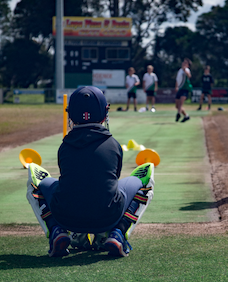Straight up I must confess that I've been a keeper for most of my cricketing career. So, there's no guessing who I think is the most important player on any cricketing side: the unheralded Wicket-Keeper!
There's a lot of pressure on wicket-keepers nowadays. To be regarded as one of the best, you not only need to be competent behind the stumps, you need an Adam Gilchrist batting average, a double degree using the DRS, quality banter for the stump mics to pick up on and a unique understanding of where fielders should be situated.
It's safe to say they've got a lot going on, so let’s go over some of the reasons you’d consider taking up wicket-keeping and discuss the major pros and cons.
Why Take It Up:
To answer this question let's take a step back and delve into my past. Cricket, like so many other sports, played a crucial part in my childhood. I played many different team sports, always being the vocal one telling players where they should be in a soccer match, setting plays at dummy half in touch footy & rugby league, gesturing like a mad man. You couldn’t keep me out of the game but in the end, I loved watching and playing cricket the most.
So, it’s simple really, I chose wicket-keeping because I always wanted to be in the game. After almost 20 years of doing it, I’m well placed to discuss what I see are the major pros and cons of giving it a go - so let’s have a look;
Pros
Fundamentals: One major pro, especially for a young player taking it on, is it helps you quickly learn the fundamentals of the game (which can be overlooked sometimes). From pitch type, field settings, batter and bowler insights, there’s no coincidence that many wicket-keepers go on to lead their sides. They’re generally a little bit further ahead when it comes to all-round cricketing knowledge.
Decision Making: Most players will be looking to the wicket-keeper to actually make a decision. You’ll have plenty of say when the captain is looking to set the field, to give input on the type of deck and which bowler will be most useful. Decision making doesn’t come easy to many, worrying about making errors does. Generally, a good keeper has one of the better feels for the game and can sense what’s next and make a move. So, who better to make the decisions!
Understanding Your Game: As a wicket-keeper, most will be quite handy with the bat. Over the years I’ve found that keeping not only helped me understand the overall game better, it also made me a more proficient batter. I found I could read pitches a lot better over the years, especially if I kept first before batting. It certainly helped with my hand-eye as well, balance at the crease and ball watching.
Cons
Battered & Bruised: If you ever had inclinations of wanting to be a hand model, wicket-keeping is not the position for you. As a keeper, you become pretty used to coming home battered and bruised after a hard day squatting, catching and throwing yourself about. It’s not for everyone but at least I always felt like I’d got a workout that day - there’s plenty of times when as just a batsman, I’d get out cheaply and do nothing in the field and come home fresher than I left.
Field Nous: Amongst other roles, you’ll need to have input into changing the field. As the keeper, you’re the eyes and ears of the team, which is fine most of the time. Sometimes when it’s not is when setting the field, in particular, the slips cordon. It’s a delicate balance based on how the pitch is playing, get it wrong and you most certainly will get the blame if one falls short.
All By Yourself: Wicket-keeping can be a bit of a lonesome experience at training most of the times, being a specialised position as it is. You’ll seldom come across quality wicket-keeping coaches at community clubs. You need to make sure that you’re taking time out to do drills that will help you as well as feedback from other players you trust.
*(Side note - if you live in Brisbane we've got a Wicket-Keeping Masterclass session as a part of our Summer Skill Development Week that we're putting on in the school holidays between 9-13th December - check it out if interested)*
Final Thoughts
There we have it, a quick look at why I think wicket-keeping has always been and continues to be the most important position on a cricket team. Like I said before, it's most certainly not for everyone but personally looking back, I’m glad that I took it up all those years ago, mainly because I would've never made it as a bowler 🙂
As always, we're interested in your feedback and whether it resonates with all the keepers out there. To all the new players taking it up, good luck and remember a good pair of inners (gloves) are your friends!
Author: Ray Britton - ACI Executive



